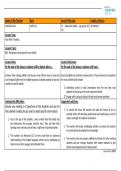Name of the Teacher Date Level of the class Length of lesson
Yolandé Fourie 14/05/24 C1 – Advanced (Adults – age group 18- 60 Minutes
25)
Lesson Type:
Four Skills - Reading
Lesson Topic:
BBC : Being kind can be good for your health
Lesson Aims: Lesson Outcomes:
By the end of the lesson, students will be better able to… By the end of the lesson, students will have…
Enhance their reading abilities and discover new efficient ways to read and Read an English text and elicit meaning from it. They will also have completed
scan through English text for multiple purposes, including reading for gist and the class activities that include:
reading for specific details.
1) Identifying correct or false information from the text they read
together by focusing on the main important details.
2) Engage with a group to discuss the text and answer questions.
Anticipated difficulties: Suggested solutions:
Include one relating to L1/age/level of the students and one for
the subskills (reading for gist and for detail/specific information) 1. To resolve this issue, the teacher will make this lesson as fun as
possible whilst still remaining professional and maintaining a level of
1. Due to the age of the students, I may consider that they might lack respect amongst the students and teacher.
the enthusiasm that younger students have. They will take their
learning more seriously and will have a high level of professionalism. 2. The teacher will include challenging activities to ensure the students
are continuously developing their knowledge.
2. The students are Advanced (C1) so they could have an advanced
understanding of the English language which may be challenging at 3. The teacher must also prepare additional activities for faster working
times to keep them engaged and stimulate them. students and pair stronger students with weaker students to give
further encouragement and a helping hand.
1 Lesson Plan 150823
, 3. Some activities may be too simple for them or they might finish
activities faster than allocated time.
Authentic Text (insert reading text here or link to the listening recording)
Being kind is good for your health:
It feels good to be kind. But did you know practicing an act of kindness a day can make you healthier? From reducing stress to increasing immunity and
protecting your heart and brain, the physical and mental health benefits of kindness have been proven across numerous scientific studies.
Margaret Clarke, MA, LPC, BC-DMT, ACT a behavioral health therapist at Summit Health, suggests five ways you can harness the power of kindness to live a
happier, healthier life.
1. Practice compassion and empathy — for yourself and others
Before you react to anything, pause… and take a deep breath. Try to walk in the other person’s shoes. Remember that peace always starts from within.
“Kindness can help us manage some of the most difficult situations in our lives,” says Ms. Clarke. “When my clients practice being kinder, whether to their
spouses, children, or coworkers, they feel much better both mentally and physically.”
That’s because kindness acts like a dimmer switch in the part of your brain that oversees emotions like worry, anxiety, and fear. When we are kind, it
activates mood-regulating neurotransmitters like serotonin and dopamine as well as hormones called endorphins, which contribute to our sense of well-
being and can aid in pain reduction.
2. Set boundaries
Are you trying to do it all? Many of us give too much energy and resources to others and leave very little time for ourselves. It may be time to start saying the
word: no. Learning to say “no” can be hard at first but it can go a long way toward reducing your stress and improving your physical well-being, such as
2 Lesson Plan 150823
, boosting the quality of your sleep or reducing your blood pressure.
“It’s OK to say ‘no,’ especially if you’re the one everyone goes to for help,” explains Ms. Clarke. “Some people are so busy being kind to others, they forget to
be kind to themselves. Ask for help more often, prioritize yourself, and remember you can say ‘no’ gently without fear of coming across as rude.”
3. Let go of anger
It can be difficult to forgive ourselves and others for past mistakes, says Ms. Clarke. However, if you take a moment to think about what contributes to your
anger, it will allow you to explore a more balanced approach to what you're thinking and feeling.
“If you yelled at your kids, acknowledge what you did, take responsibility for it, and give everyone — including yourself — a break so you can move on,” she
advises. “Being stuck in anger can create more suffering."
Chronic anger can be bad for our hearts, adds Ms. Clarke. Research shows losing your temper can trigger a heart attack for up to two hours after the anger
has subsided.
Being kind can achieve the opposite effect: It releases a hormone called oxytocin, which decreases blood pressure, boosts your heart health, and lowers
harmful inflammation in your body.
4. Volunteer your time
Find a cause you care about or help someone you know who is in need, such as an elderly neighbor. Beyond creating a sense of connection and enhancing
your relationships with others, volunteering can boost your self-esteem and well-being.
Practicing kindness through acts of charity can even help you live longer. Volunteer work has been found to contribute to people’s overall longevity, notes
Ms. Clarke.
5. Show kindness in your workplace
Bake a cake for your colleagues, invite your team out to lunch, or pay a genuine compliment to someone you work with. These acts may sound simple, but
3 Lesson Plan 150823




